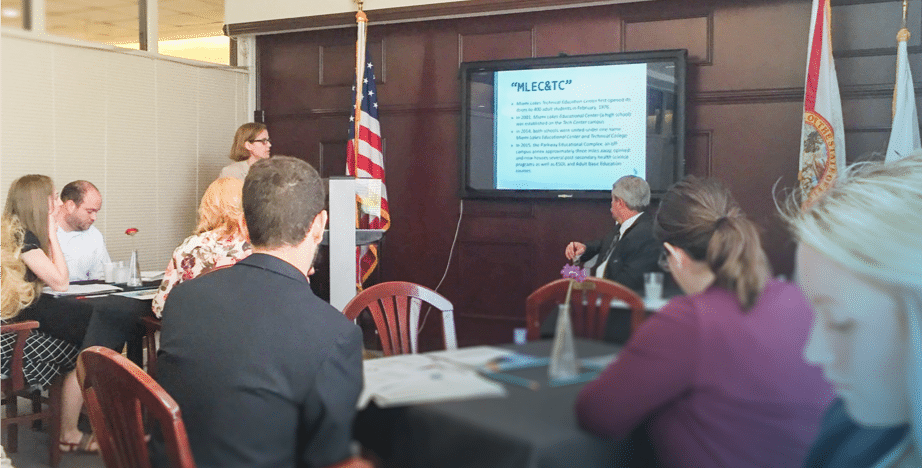Overview
There have been increased calls for the use of research to inform education policy and practice. However, many barriers often prevent researchers, policymakers and practitioners from working together effectively. In addition to limited understanding of research among policymakers and practitioners, researchers’ agendas often do not coordinate with practitioner needs. Social networks, intermediaries, and partnerships between research organizations and school districts can play a critical role in disseminating and interpreting research. The challenge is informing policymakers and practitioners of these existing opportunities, and the best way to take advantage of them.
On December 5th, AYPF hosted a webinar highlighting the use of research-practice partnerships. Presenters included Dr. Cynthia Coburn, Professor at Northwestern University and author of “Research-Practice Partnerships: A Strategy for Leveraging Research for Educational Improvement in School Districts”; Dr. Phil Bell, Professor and Director of the Institute for Science and Math Education, University of Washington; and Dr. Amy Gerstein, Executive Director, John W. Gardner Center for Youth at Stanford University.
Presenters
Dr. Phil Bell, Professor, University of Washington
Dr. Cynthia Coburn, Professor, Northwestern University
Dr. Amy Gerstein, Executive Director, John W. Gardner Center for Youth at Stanford University
Presenter Biographies
 Philip Bell is a scholar of learning and equity who focuses on science education. He pursues a cognitive and cultural program of research about how people learn about science and technology in ways that are personally consequential to them both in and out of school. His current work involves design-based approaches to developing new educational experiences and resources as well as broad-scale implementation research conducted through collaborative partnerships between researchers and practitioners. Bell is a professor of the Learning Sciences & Human Development at the University of Washington Seattle and holds the Geda and Phil Condit Professorship of Science and Mathematics Education. He is the Executive Director of the UW Institute for Science and Math Education that conducts innovative R&D projects focused on promoting equity in STEM education across educational systems. He recently served on the National Research Council committee that authored the Framework that guided development of the Next Generation Science Standards. Bell has a background in human cognition and development, science education, computer science, and electrical engineering.
Philip Bell is a scholar of learning and equity who focuses on science education. He pursues a cognitive and cultural program of research about how people learn about science and technology in ways that are personally consequential to them both in and out of school. His current work involves design-based approaches to developing new educational experiences and resources as well as broad-scale implementation research conducted through collaborative partnerships between researchers and practitioners. Bell is a professor of the Learning Sciences & Human Development at the University of Washington Seattle and holds the Geda and Phil Condit Professorship of Science and Mathematics Education. He is the Executive Director of the UW Institute for Science and Math Education that conducts innovative R&D projects focused on promoting equity in STEM education across educational systems. He recently served on the National Research Council committee that authored the Framework that guided development of the Next Generation Science Standards. Bell has a background in human cognition and development, science education, computer science, and electrical engineering.
 Cynthia E. Coburn is Professor at the School of Education and Social Policy, Northwestern University. Coburn studies the relationship between instructional policy and teachers’ classroom practices in urban schools. In a series of studies she has investigated critical issues facing public schools, including the relationship between reading policy and teachers’ classroom practice, the scale-up of innovative mathematics curricula, the implementation of Common Core State Standards, and the relationship between research and practice for school improvement. In 2011, Coburn was awarded the Early Career Award from the American Educational Research Association in recognition of her contributions to the field of educational research in the first decade of her career. Coburn has a BA in philosophy from Oberlin College, and a MA in Sociology and a PhD in Education from Stanford University.
Cynthia E. Coburn is Professor at the School of Education and Social Policy, Northwestern University. Coburn studies the relationship between instructional policy and teachers’ classroom practices in urban schools. In a series of studies she has investigated critical issues facing public schools, including the relationship between reading policy and teachers’ classroom practice, the scale-up of innovative mathematics curricula, the implementation of Common Core State Standards, and the relationship between research and practice for school improvement. In 2011, Coburn was awarded the Early Career Award from the American Educational Research Association in recognition of her contributions to the field of educational research in the first decade of her career. Coburn has a BA in philosophy from Oberlin College, and a MA in Sociology and a PhD in Education from Stanford University.
 Amy Gerstein joined the Graduate School of Education as Executive Director of the John W. Gardner Center for Youth and Their Communities in 2009. In this capacity, she provides leadership and strategic direction for the Center’s community-based research and policy work. Gerstein brings the rich experience of a career in educational policy and research, curriculum and instruction, district reform, professional development and project management to her leadership role at the Gardner Center. With extensive ties to Stanford’s near-neighbor community as well as a national profile in the fields of education and youth development, Gerstein is actively involved in fostering relationships between the university and youth-serving organizations to catalyze community change – close to home and in cities across the country. A skilled coalition-builder, she oversees a staff of researchers and policy analysts engaged in a program of rigorous research and capacity building that brings together and informs practitioners, policy makers, educators and youth advocates.
Amy Gerstein joined the Graduate School of Education as Executive Director of the John W. Gardner Center for Youth and Their Communities in 2009. In this capacity, she provides leadership and strategic direction for the Center’s community-based research and policy work. Gerstein brings the rich experience of a career in educational policy and research, curriculum and instruction, district reform, professional development and project management to her leadership role at the Gardner Center. With extensive ties to Stanford’s near-neighbor community as well as a national profile in the fields of education and youth development, Gerstein is actively involved in fostering relationships between the university and youth-serving organizations to catalyze community change – close to home and in cities across the country. A skilled coalition-builder, she oversees a staff of researchers and policy analysts engaged in a program of rigorous research and capacity building that brings together and informs practitioners, policy makers, educators and youth advocates.
Prior to arriving at the Gardner Center, Gerstein was Executive Director of the Noyce Foundation, and Executive Director of the Coalition of Essential Schools. She has been a consultant to foundations, educational organizations and nonprofits and has taught high school science, outdoor education and teacher education. Gerstein is a founding member of the California Collaborative for District Reform, and serves as Vice-Chair of the East Palo Alto YMCA. She holds a PhD in Education from Stanford University and a BA in Geology-Biology from Brown University.
Click here to view part 1 of the slideshow
Click here to view part 2 of the slideshow
Click here to watch the webinar on our YouTube channel
Dr. Phil Bell
Professor
206.543.2100
Dr. Cynthia Coburn
Professor
633 Clark Street
Evanston, IL 60208
312.503.8649
Dr. Amy Gerstein
Executive Director
The John W. Gardner Center for Youth at Stanford University
365 Lasuen Street
Stanford, CA 94305-3083
650.723.3099



